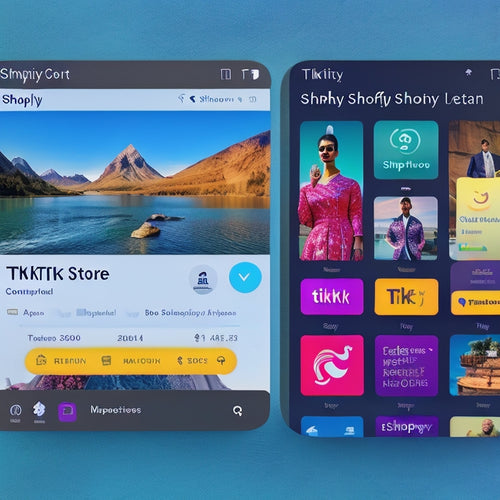
Ecommerce Growth Hacks Through Online Courses
Share
You're looking to turbocharge your ecommerce business with actionable growth hacks. Online courses can be a game-changer, but you need to choose ones that focus on results-driven strategies. Look for courses that incorporate gamification, immersive virtual classrooms, and personalized learning experiences to keep you engaged. Real-world case studies from successful companies like Airbnb and Zappos can provide valuable insights. By applying what you learn, you'll be able to drive traffic, boost sales, and build a loyal customer base. Now, get ready to take your ecommerce business to the next level with the right online course - and discover the secrets to sustained growth and success.
Key Takeaways
• Online courses can provide ecommerce growth hacks through interactive simulations, practice, and real-world case studies, improving decision-making and critical thinking.
• Personalized learning experiences and AI-driven adaptive assessments help identify knowledge gaps and optimize strategies for ecommerce growth.
• Expert-led live online sessions and virtual networking opportunities offer personalized guidance, industry insights, and access to successful ecommerce ventures.
• Gamification, community engagement, and loyalty programs can increase engagement, retention, and motivation in ecommerce online courses, leading to faster growth.
• By applying learnings from success stories like Airbnb and Zappos, ecommerce entrepreneurs can develop effective growth strategies, including value proposition and optimization.
Crafting Engaging Learning Paths
To create an online course that truly resonates with your ecommerce audience, you need to craft a learning path that's as engaging as a treasure hunt, guiding students through a series of 'aha' moments that ultimately lead to tangible results. This means designing a sequence of lessons that build upon each other, each one revealing a new insight or skill that propels students forward.
To keep students hooked, you'll need to incorporate engaging activities that encourage participation and foster a sense of community. Think interactive quizzes, group discussions, and hands-on exercises that challenge students to apply what they've learned.
These activities not only break up the monotony of video lectures but also provide valuable feedback and opportunities for reflection. By weaving these elements together, you'll create a learning path that's both informative and entertaining – one that students will look forward to progressing every step of the way.
Building Immersive Virtual Classrooms
You step into the virtual classroom, and suddenly, you're surrounded by a vibrant community of ecommerce entrepreneurs, all ready to explore into the world of online learning. This immersive environment is designed to simulate real-world experiences, making you feel like you're part of a dynamic ecosystem.
To take your learning experience to the next level, look for virtual classrooms that offer:
-
Virtual networking opportunities to connect with peers and mentors
-
Interactive group projects that foster collaboration and innovation
-
Industry-specific case studies that provide real-world insights and applications
-
Collaborative problem-solving activities that help you tackle complex ecommerce challenges
-
Live Q&A sessions with instructors and industry experts
Gamification for Higher Engagement
When you incorporate gamification into your online course, you'll notice a significant boost in engagement.
You'll earn rewards easily, accessing exclusive content and getting entry to premium features.
Earn Rewards Easily
By incorporating gamification elements, such as points, badges, or leaderboards, into your online course, you can create a sense of friendly competition that motivates learners to earn rewards easily. This approach not only boosts engagement but also encourages learners to take action, complete tasks, and achieve milestones.
To take it to the next level, consider implementing the following strategies:
-
Offer loyalty programs that reward learners for consistent progress or completion of specific modules.
-
Introduce referral bonuses for learners who invite friends to join the course.
-
Collaborate with influencers in your niche to promote the course and offer exclusive rewards to their followers.
-
Create a community engagement platform where learners can interact, share their progress, and compete with each other.
-
Host live sessions or webinars that provide learners with opportunities to ask questions, share their experiences, and earn rewards for active participation.
Unlock Exclusive Content
Taking your gamification strategy to the next level, access exclusive content that only becomes available once learners have achieved specific milestones or completed certain tasks. This is where the real magic happens, and you get to reveal the secrets of ecommerce growth hacking. You'll gain access to exclusive insights from industry thought leaders, expert guidance on the latest trends, and insider tips that will give you a competitive edge.
As you progress through the course, you'll reveal new content that's tailored to your needs and interests. You might gain access to expert interviews, case studies, or even personalized coaching sessions. The more you engage with the course, the more you'll disclose, and the faster you'll see results in your ecommerce business.
You'll stay ahead of the curve with the latest industry trends and insights, and you'll be able to apply them to your business in real-time. By revealing exclusive content, you'll be able to take your ecommerce business to new heights and achieve the success you've always dreamed of.
Beat The Leaderboard
You'll supercharge your engagement strategy by introducing a leaderboard that pits learners against each other, fostering a competitive spirit that motivates them to complete more tasks and achieve their ecommerce goals faster. This gamification technique is a powerful way to boost motivation and encourage learners to take action.
By tracking performance and setting goals, learners can see how they stack up against their peers and push themselves to climb the ranks.
Here are some leaderboard tactics to take your competition strategies to the next level:
-
Rank learners by points or badges earned, giving them a clear target to aim for
-
Highlight daily or weekly leaders, creating a sense of urgency and encouraging learners to stay on top
-
Offer rewards for top performers, such as exclusive content or discounts
-
Create teams or cohorts, allowing learners to collaborate and compete together
-
Make it easy to track progress, with clear metrics and regular updates
Personalized Learning Experiences
What if you could tailor your ecommerce education to your unique needs and goals, cutting through the noise and focusing on the skills that'll drive real growth for your business? With personalized learning experiences, you can do just that.
You'll no longer have to sift through generic courses or tutorials that don't speak to your specific pain points. Instead, you'll get customized content that addresses your exact needs, whether it's improving your product listing ads or optimizing your checkout process.
Through interactive exercises and real-time feedback, you'll be able to apply what you learn directly to your business. This isn't just about checking boxes or completing modules – it's about driving tangible results.
By leveraging AI-powered learning platforms, you'll get a tailored curriculum that adapts to your progress, strengths, and weaknesses. You'll learn at your own pace, and you'll be able to track your progress every step of the way.
The result? You'll be equipped with the skills and confidence to take your ecommerce business to the next level, faster and more efficiently than ever before.
Real-World Ecommerce Case Studies
You're about to discover the real-world ecommerce success stories that will inspire your own online venture. These profitable case studies will show you the business growth strategies that have worked for others, and how you can apply them to your own ecommerce business.
Ecommerce Success Stories
From Airbnb to Zappos, ecommerce success stories abound, offering valuable insights into the strategies and tactics that have propelled these companies to the top of the online retail landscape.
As an ecommerce entrepreneur, you can learn a lot from these success stories and apply them to your own business. For instance, you can learn how to create a unique value proposition, optimize your website for conversions, and leverage social media to drive sales.
You can also learn how to build a loyal customer base, offer exceptional customer service, and create a sustainable business model.
Here are some key takeaways from ecommerce success stories:
- Identify a specific niche or market gap and dominate it
- Develop a unique brand identity and voice
- Focus on providing exceptional customer service and building trust with customers
- Continuously test and optimize your website and marketing strategies
- Stay ahead of the competition by innovating and taking calculated risks.
Profitable Online Ventures
Seven-figure ecommerce entrepreneurs have one thing in common: they've cracked the code to creating profitable online ventures that drive real revenue and growth. You can do the same by understanding the ecommerce trends and conducting a thorough market analysis. This will help you identify opportunities to capitalize on and create a competitive edge.
Here are some real-world examples of profitable online ventures:
| Venture | Key to Success |
|---|---|
| Fashion Nova | Utilized Instagram influencers and SEO tips to drive traffic and sales |
| Warby Parker | Offered home try-on and free shipping to disrupt the eyewear industry |
| Glossier | Built a loyal community through social media and email marketing |
| Casper | Created a seamless online-to-offline experience with their mattress brand |
These ventures have mastered digital marketing strategies, including SEO tips, to reach their target audience and drive conversions. By studying their approaches, you can apply similar tactics to your own ecommerce business and start seeing real results. Remember, it's not about being the first to market, but about being the best.
Business Growth Strategies
By examining the business growth strategies of successful ecommerce companies, you'll uncover actionable insights to fuel your own online business expansion. These companies didn't stumble upon success by chance; they employed deliberate marketing strategies and business development tactics to drive growth. You can do the same by analyzing their approaches and applying them to your own business.
Here are some key takeaways from real-world ecommerce case studies:
-
Diversify your marketing channels: Don't put all your eggs in one basket. Experiment with different marketing strategies, such as social media, email marketing, and influencer partnerships, to reach a wider audience.
-
Conduct regular market analysis: Stay ahead of the competition by monitoring industry trends and adjusting your business strategy accordingly.
-
Prioritize customer retention: Focus on building strong relationships with your existing customers to encourage repeat business and positive word-of-mouth.
-
Develop a strong brand identity: Establish a unique brand voice and aesthetic to differentiate yourself from competitors.
-
Stay adaptable and agile: Be prepared to pivot your strategy if something isn't working, and be open to new opportunities as they arise.
Interactive Simulations for Practice
You can accelerate your ecommerce growth by leveraging interactive simulations that mimic real-world scenarios, allowing you to practice and refine your skills in a risk-free environment. This approach helps you build confidence and develop muscle memory, so when you face similar challenges in real life, you'll be better equipped to tackle them head-on.
Through interactive role-playing, you'll get to experience different ecommerce scenarios, making decisions and seeing the consequences of your actions in real-time. This hands-on approach helps you develop critical thinking, problem-solving, and decision-making skills.
Scenario-based challenges, on the other hand, present you with complex, open-ended problems that require creative solutions. You'll learn to think on your feet, adapt to changing circumstances, and develop a growth mindset.
Measuring Learning Outcomes Effectively
As you create an online course to boost your ecommerce growth, it's vital to measure the learning outcomes effectively.
You'll want to track the right metrics, set clear objectives, and identify knowledge gaps to guarantee your students are getting the most out of your course.
Track Key Performance Metrics
To maximize the impact of your ecommerce online courses, tracking key performance metrics that measure learning outcomes effectively is critical, providing a clear picture of what's working and what areas need improvement. You can't afford to fly blind, relying on guesswork or assumptions about what's driving results.
By monitoring the right metrics, you'll be able to refine your strategy, optimize your sales funnels, and boost website traffic.
Here are some essential metrics to keep an eye on:
-
Conversion rates: Are students completing your courses and taking action?
-
Customer retention: Are students coming back for more, or dropping off?
-
Course engagement: Are students actively participating and interacting with the material?
-
Time to completion: How long is it taking students to finish your courses?
-
Net promoter score: Are students happy with their experience, and would they recommend it to others?
Set Clear Learning Objectives
By establishing clear learning objectives, you'll create a roadmap for measuring the effectiveness of your ecommerce online courses, ensuring students achieve tangible outcomes that drive business results. This is vital for ecommerce growth, as it allows you to track progress and evaluate performance. Effective goal setting enables you to identify what skills your students need to develop and what knowledge gaps need to be bridged.
| Learning Objectives | Measurable Outcomes |
|---|---|
| Increase product knowledge | Students can accurately describe product features and benefits |
| Improve sales skills | Students can successfully close a sale with a customer |
| Enhance customer service skills | Students can resolve customer complaints within a set timeframe |
| Develop marketing skills | Students can create a social media campaign that increases engagement by 20% |
Identify Knowledge Gaps
You'll need to pinpoint exactly where your students are struggling, so you can tailor your ecommerce online course to fill those knowledge gaps and drive meaningful results. To do this, you must identify the strengths, weaknesses, opportunities, and threats (SWOT analysis) in your students' current ecommerce knowledge. This will help you understand what they need to learn to succeed in the competitive ecommerce landscape.
Conduct market research to analyze your students' pain points, and identify areas where they're struggling. This could include:
- Ineffective product listing strategies
- Poor search engine optimization (SEO) techniques
- Inadequate social media marketing skills
- Difficulty with competitive analysis and market research
- Inefficient order fulfillment and shipping processes
Expert-Led Live Online Sessions
How do you accelerate your ecommerce growth when you need personalized guidance and support? One way is through expert-led live online sessions. These sessions offer a unique opportunity to learn from industry experts and get answers to your specific questions.
| Benefits | Features | Outcomes |
|---|---|---|
| Virtual networking opportunities | Interact with industry peers | Expand your professional network |
| Live Q&A sessions | Get answers to your questions | Clarify doubts and misconceptions |
| Expert led workshops | Learn from industry experts | Gain practical knowledge and insights |
| Industry insights | Stay updated on the latest trends | Make informed business decisions |
Through live online sessions, you can tap into the collective knowledge and experience of industry experts. You'll gain valuable insights, learn from their successes and failures, and get personalized guidance on your ecommerce growth strategy. With virtual networking opportunities, you'll expand your professional network and make connections that can help you grow your business. By leveraging expert-led live online sessions, you'll be able to overcome obstacles, optimize your ecommerce strategy, and accelerate your growth.
Bite-Sized Microlearning Modules
In today's fast-paced ecommerce landscape, bite-sized microlearning modules provide a convenient and effective way to learn new skills and strategies on the go. You can fit them into your busy schedule, whether it's during your daily commute, lunch break, or whenever you have a few spare minutes. These modules are designed to be concise, focused, and easy to digest, allowing you to absorb information quickly and efficiently.
Here are some benefits of bite-sized microlearning modules:
-
Flexible learning: Learn at your own pace, whenever and wherever you want
-
Improved retention: Break up complex topics into manageable chunks for better understanding and recall
-
Increased engagement: Interactive tutorials and gamification make learning fun and interactive
-
Personalized learning: Focus on the topics that matter most to you and your business
-
Time-saving: Get straight to the point, no fluff or unnecessary information
With bite-sized microlearning modules, you can stay up-to-date with the latest ecommerce trends and strategies, without sacrificing precious time. You'll be able to apply your new skills and knowledge immediately, driving growth and success in your online business.
AI-Driven Adaptive Assessments
To make sure you're applying your new ecommerce skills effectively, AI-driven adaptive assessments step in to measure your understanding and provide personalized feedback. These assessments are designed to simulate real-world ecommerce scenarios, testing your skills in a practical and immersive way.
Through adaptive learning, the assessment adjusts its level of difficulty and content in real-time, based on your performance. This guarantees you're challenged to grow, but not overwhelmed.
As you progress, the AI-driven system analyzes your strengths and weaknesses, providing actionable insights to refine your skills. You'll receive personalized feedback on areas that need improvement, along with targeted resources to help you bridge the gap.
This data-driven approach ensures you're not just learning, but retaining and applying your new skills effectively. With AI-driven adaptive assessments, you'll be able to track your progress, identify knowledge gaps, and make data-driven decisions to optimize your ecommerce strategy.
Frequently Asked Questions
Can Online Courses Really Increase My Ecommerce Sales Revenue?
"You're skeptical, but trust us, online courses can boost your ecommerce sales revenue - by teaching you conversion optimization, social media marketing, email campaigns, and customer engagement strategies that drive real results."
How Do I Ensure Learners Stay Motivated Throughout the Course?
To keep learners motivated, you'll want to implement engagement strategies like interactive quizzes, rewards, and real-time feedback, while also incorporating motivation techniques like goal-setting, progress tracking, and peer support to keep them driven and invested.
What Is the Ideal Length for Ecommerce Online Course Modules?
"Learning is like building with LEGOs - each piece must fit perfectly. You'll want to structure your modules like a puzzle, with 20-30 minute chunks of interactive content to keep learners engaged and boost retention."
Can I Customize Online Courses to Fit My Brand's Specific Needs?
You can tailor online courses to fit your brand's unique voice and style, ensuring brand alignment and customized content that speaks directly to your target audience, offering personalization opportunities that drive real results.
Do Online Courses Provide Any Certifications or Credentials?
You're likely aware that 80% of consumers consider certification a top factor when choosing a service provider. Fortunately, many online courses offer certifications with validity and credential recognition, giving you a competitive edge in your industry.
Related Posts
-

How Do I Enable TikTok Integration on My Shopify Store
The integration of TikTok on Shopify stores has gained attention due to its potential benefits for businesses. This ...
-

Why and How to Create a Sitemap for Improved SEO
This article explores the significance of creating a sitemap for enhanced search engine optimization (SEO) and provi...
-

Boost Ad Performance and ROI With the Advertiser Success Center
The Advertiser Success Center is a comprehensive platform that offers valuable insights and tools to assist advertis...


